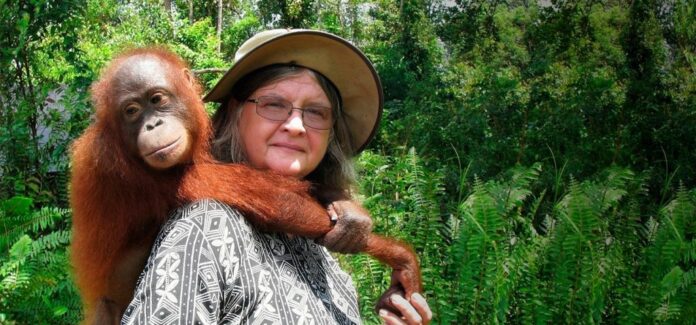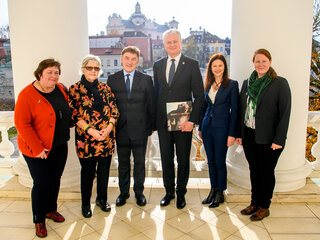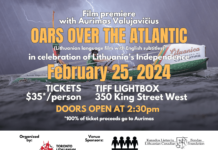
Online Lecture Available on Youtube
Who is Birutė Galdikas? Born in Germany to Lithuanian refugees fleeing the Soviet regime, she was raised in Toronto, Canada, and became a world-renowned anthropologist, environmentalist and orangutan specialist. She lived in the jungles of Borneo, and has been recognized as one of the most prominent scholars of the century worldwide, with the results of her research becoming one of the most extensive studies on any single species of wild mammal.

In late October, Dr. Galdikas visited Lithuania on the occasion of the 50th anniversary of her work. She met with Lithuanian president Gitanas Nausėda, who noted: “With her example, Birutė Galdikas shows that science is meaningful and inspiring. We have to create conditions for our country’s scientists to change the world. Respect and a proper position for science in the state is one of our priorities.” Nausėda and Galdikas discussed assistance for Lithuanian scientists and ways to create conditions for them to contribute to positive environmental challenges.
They also spoke about the worsening biodiversity situation and links between people’s health and the ecosystem, especially as highlighted by the coronavirus pandemic.
This year marks 50 years since Galdikas set up the first orangutan observation centre in Tanjung Puting National Park, on the Indonesian island of Borneo. She continues her conservation work to this day. During her visit she gave a public lecture at Vytautas Magnus University in Kaunas and participated in a forum of the Lithuanian World Community.
Her lecture, which can be viewed on YouTube:
Prof. Birutė Galdikas vieša paskaita – YouTube) was given in English and was a fascinating story of how she began her studies and was mentored, with her two colleagues, scientists Jane Goodall and Dian Fossey by paleoanthropologist Dr. Louis Leakey. During the lecture she also outlined the differences between bonobos, chimpanzees, gorillas and orangutans, and spoke extensively about their habits and the threats to their existence in Kalimantan, Indonesian Borneo. With support from the Indonesian government, she specifically worked to rehabilitate wild-born ex-captive orangutans and for the protection of tropical rainforests in Indonesia.
In Los Angeles in 1989, the professor founded the Orangutan Foundation International, and is president of this non-profit dedicated to the conservation of wild orangutans and their rainforest habitat. The foundation operates in the US, Australia, Indonesia and the UK, and is currently being set up in Lithuania. She now travels all over the world presenting her studies and explaining the importance of preserving tropical rainforests, educating children, students and adults both in Borneo and abroad about factors endangering the primates.
The threats are primarily illegal logging, mining for zircon (used in bullet-proof windshields) and the burning of forests to exclusively cultivate palm trees for the production of palm oil. In order to protect the ancient forests, she and her organization, with 230 local employees and many volunteers, promote tree-planting through school programs (they have already planted over 500,000 trees) and other projects.
Her advice to all and any hoping to prevent the extinction of the primates and others in their natural habitat, whether in Indonesia or elsewhere, is to say NO to palm oil, to recycle paper, and to protect and plant native trees wherever we may live.
Six books have been written about Dr. Galdikas and her work, and several documentaries created in Indonesia, Japan, France, Italy and Australia. She is the recipient of various awards, including the Tyler Prize for Environmental Achievement, the Indonesian Kalpataru (Hero of the Earth) Award, Officer of the Order of Canada, Lithuania‘s Order of Merit Officer‘s Cross, the Queen Elizabeth II Commemorative Medal and Queen Elizabeth II Jubilee Medal, the PETA Humanitarian Award and te United Nations Global 500 Award.
Information from www.lithuania.travel, LRT.lt, YouTube





























